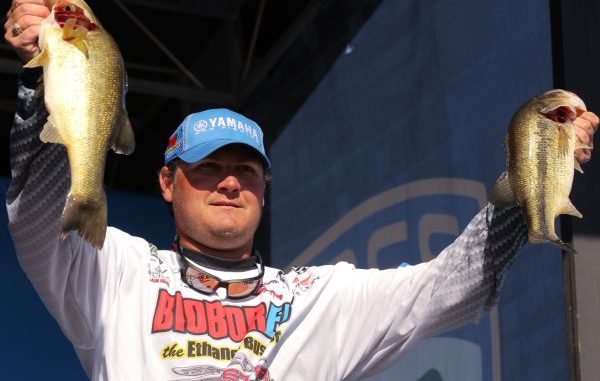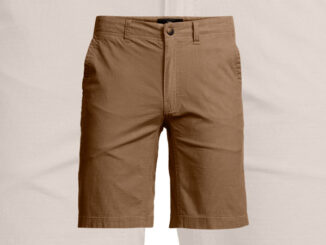
The ‘Cajun Baby’ discusses how he plans to fish Lake Guntersville in February, and recounts one of his best days ever on the water
When B.A.S.S. Elite Series pro Cliff Crochet heads to North Alabama’s Lake Guntersville in mid-February to fish in his second Bassmaster Classic, he might actually pinch himself a couple times on the long drive up — just to make sure he’s not dreaming.
“Fishing two Classics?” Crochet asked. “At one time I was happy just to go to a Classic as a fan. You never think you would ever get to actually fish in one.
“And now I get to fish in two? Can you imagine having everything you ever wanted? That’s about what this is for me.”
The 30-year-old “Cajun Baby,” who still calls Pierre Part home, qualified for the 2010 Classic at Lay Lake near Birmingham, Ala., and finished in 13th place with 28.15 pounds in a tournament won by Kevin VanDam.
This year, powered by a ninth-place finish on Falcon Lake in March, Crochet finished the season in 10th place in the Toyota Angler of the Year standings.
And he’s heading into the 2014 Classic with a decidedly different attitude from four years ago.
“The first one, I wanted to make sure I had a good tournament,” Crochet said. “For this one, it’s how do I figure out a way to win?
“The first one, really, winning was probably the furthest thing from my mind. What I mean by that is I probably didn’t scout for the type of fish I needed to win. I just wanted to find some fish and have a good tournament. Going into this one, I want to find the right fish. The winning fish. And on Lake Guntersville, you better be on the right ones.”
The 75-mile, 69,000-acre fishery fed by the Tennessee River is known for producing some monster bass, and lots of them. And Crochet predicted the three-day winning weight in February will break the Classic record of 75 pounds, 9 ounces set in 1984 by Rick Clunn. (The daily limit in 1984 was seven bass. Kevin VanDam holds the Classic record for heaviest catch in the five bass era with 69-11 in 2011.)
“It’s going to be a slugfest,” he said. “Lowballing, I’m going to say 78 pounds at the absolute lowest. That’s 26 to 27 (pounds) a day, every day.
“You can almost bet on it. That’s what lives there, and that’s what it’s going to be.”
Crochet plans on taking a couple of scouting trips this fall before the lake goes off limits on Jan. 1.
“I want to see where the grass is now, the ditches, that kind of stuff,” he said. “It’s not so much about how to catch them this fall; it’s more idling and looking, looking and idling.
“You’re not quite sure what you’re looking for, but when you see it, you’ll know it.”
One unknown factor for each of the 56 Classic competitors will be the weather in northeast Alabama come the last week of February.
“We could pull up at that Classic and be bundled up like Eskimos with 25-degree weather and snow, and it would be a pure winter tournament,” Crochet said. “Or we could pull up to take off and its 50 degrees outside, and it’s a spring tournament.
“We just have to sit and wait and see how that’s going to play out.”
Whatever happens weather-wise, this will definitely be more of a business trip than his first Classic at Lay Lake.
“You have to focus and take care of fishing. For 56 people, it’s a fishing tournament,” Crochet said. “For the other 100,000 people who go, it’s a show or vacation.
“But when you’re fishing, you can’t forget it’s a tournament.”
One 2013 tournament that Crochet won’t soon forget was the Falcon Slam at Falcon Lake in Zapata, Texas, this past March.
He started Day 2 in 50th place with 18 pounds, 2 pounds, and enjoyed a day on the water like he hadn’t experienced before — or since.
“Day 2 at Falcon was something you wait for,” Crochet said. “ Causing a scene at a Bassmaster tournament is something I’ve dreamed about forever.”
The “scene” was created by a 35.3-pound stringer for the day, (the second-largest Elite Series stringer weighed in all year long,) including Crochet’s first-ever 10-pound largemouth.
To hear him recount that amazing morning on the water is like reliving every bass fisherman’s dream day.
“The cool thing about it was it came out of nowhere,” he said “I figured I needed to catch about 22 pounds to have a chance to finish in the Top 10, get 10 grand and get some decent points.”
His hopes for the day started to change about 90 minutes in that morning after the first fish he landed weighed 10 pounds, 2 pounds on his scale.
“I flipped on a tree, I feel a bite, set the hook, cranked on him real hard and the fish comes up on the other side of the tree,” Crochet said. “As soon as I saw it, I knew it’s a 10-pounder.”
With that monster safely in the livewell, he figured if he could get four more bites, he’d have the 22 pounds that he hoped for at the start of the day.
“At that point, I’d get paid, I’d get some points and life is good,” he said. “So that kind of chilled me out a little bit. So I keep flipping, just keep flipping.”
Shortly after that, Crochet followed up the lunker with a 4-pounder, and then a nice 8-pounder.
“That gives me about 22 (pounds), and my biggest stringer ever was 22.5 pounds,” he said. “I know if I get one more bite, no matter how big it is, if it’s a keeper I get $10,000 and I get to fish the next day.”
Twenty minutes later, miraculously he landed yet another 8-pounder. He followed that up with another 4- to 5-pounder by around noon, and was pretty sure he had 33 or 34 pounds of bass in the livewell. (Watch Cliff weigh one of the 8-pound bass in a video taken from his boat that day on Falcon Lake, and see him catch the final 4-pounder in the video attached to this story.)
“It was awesome,” he said. “I just kept asking for one more good one. One more good one. And there it was.
“They just kept coming.”
He left his spot about 20 minutes early just to make sure he made it back to the landing in time.
“It was all cool when I got back,” Crochet said. “I got my weigh-in bag and I turned around and took about two steps. Then I thought to myself, ‘There’s no kinda way you can put all those fish in one bag.’ So I turned around and asked for another bag.
“And when you ask that question, people start looking at you.”
Once the fish were all checked in alive, but before the official weigh-in onstage, Crochet started to realize what he had just accomplished.
“That’s when I started getting nervous because I knew this was about to be something that I had waited on forever, and you never know if it’s going to happen,” he said. “I knelt down on the side of the tubs with the water in it, and I kept wiping my face down.
“I was getting hot. I was really amped up. I think I was about to pass out I just didn’t want to be disappointed. I thought I had 34 (pounds), but I just didn’t want to see 32 or 33 pop up on the scale.”
Needless to say he was ecstatic when the digital scale showed 35-3. See the video from the weigh-in here.
“When I saw 35 — there’s no way I thought I had 35 pounds,” he said. “That was the first time I ever got excited on that stage.
“I’ve been shaken up and I’ve been heartbroken and nervous and happy, but that was the first time I ever got really excited on that stage. It was awesome.”
Awesome also was how the Cajun Baby describes his fans, especially right here in his home state.
“The fans and support coming from Louisiana is overwhelming. It’s pretty cool, and I appreciate it,” he said. “We have fans from all over the country, but there’s nothing like people from home.”
And one tournament he’s already looking forward to next year is the Elite Series stop scheduled for May 15-18 at Toledo Bend Reservoir.
“I’ve been very disappointed in how I’ve fished Toledo Bend,” he said, recalling two poor showings there: a 48th-place finish in 2011, followed by a 72nd-place finish in 2012. “Being from Louisiana, they’ve got a whole bunch of coonasses there and they’re pulling for you, and that’s disappointing.
“You want to do well in a home-state tournament. It owes me one.”
Representing Louisiana all over the country is something the Cajun Baby takes very seriously. In fact, he created his nickname somewhere on Interstate 10 between Palatka, Fla., and Biloxi, Miss., one night while driving back from the Southern Open in 2008.
“I would see all these Elite guys, with sayings and quotes,” he said. “I thought if I ever made it, I’d need some kind of saying, too. So I figured I could come up with something.
“So I was driving home, and I started thinking about Cajun-something or something-Cajun, and I thought of Cajun Baby. ‘Cajun Baby Fishing‘ — there it is.”
He was following fellow angler Jamie Laiche home that night, so he called him to tell him about the nickname he’d created.
“I said, ‘Dude, listen to this., “ Crochet said. “And Jamie said, ‘You’re stupid.’
“But that’s the stupidest smartest thing I’ve ever done in my whole life. It’s ridiculous. Who comes up with something like that?”
It’s a perfect fit for the one-time Assumption Parish sheriff’s deputy, whose Cajun roots remain firmly planted at home.
“I’m never leaving, never. The sinkhole could swallow Pierre Part and I would still never leave. Bobby Jindal himself couldn’t take me out of Pierre Part.”


